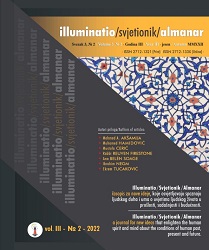Naslijeđe Rašida Ridaa
Rashid Rida’s legacy
Author(s): Ana Belén SoageSubject(s): Philosophy of Religion, Contemporary Islamic Thought, Sociology of Religion
Published by: Centar za dijalog - Vesatijja
Keywords: Rashīd Riḍā; Jamāl al-Dīn al-Afghānī; Muḥammad ‘Abduh; al-“Urwa al-wuthqā; al-Manār; ijtihād; taqlīd; Salafism; sharīʿah; maṣlaḥa; shūrā; Islam; politics;
Summary/Abstract: This article is a comparative portrayal of three main figures of Islam in modern times, namely Jamāl al-Dīn al-Afghānī, Muḥammad ‘Abduh and Rashīd Riḍā with a particular focus on Shykh Rashīd Riḍā’s legacy of a mixture of an Islamic reform with Islamic tradition (Salafism). Jamāl al-Dīn al-Afghānī is portrayed as a revolutionary who saw in Islam elements of unity and mobilization. He is described by some as “the father of modern Muslim anticolonialism.” Muḥammad ‘Abduh is described as a pragmatic gradualist who believed in reconciling revelation with reason, advocating for a religion that has essentially a moral function. Both tried to prove that well understood Islam is not incompatible with modernity, and encouraged Muslims to embrace the latter without abandoning the former. Although strongly associated with these two of his teachers, Rashīd Riḍā, however, perceived modernity as a threat and felt that successive concessions to it would lead to the wholesale abandonment of religion. His alternative was an Islam that controls all aspects of individual and social life; this idea, implicit in most of his writings, is made clear in this article as an interplay between modernism and traditionalism (Salafism) in Islam that still resonate among some Muslim scholars.
Journal: Illuminatio/Svjetionik/Almanar
- Issue Year: 3/2022
- Issue No: 2
- Page Range: 192-255
- Page Count: 64
- Language: Bosnian, English

